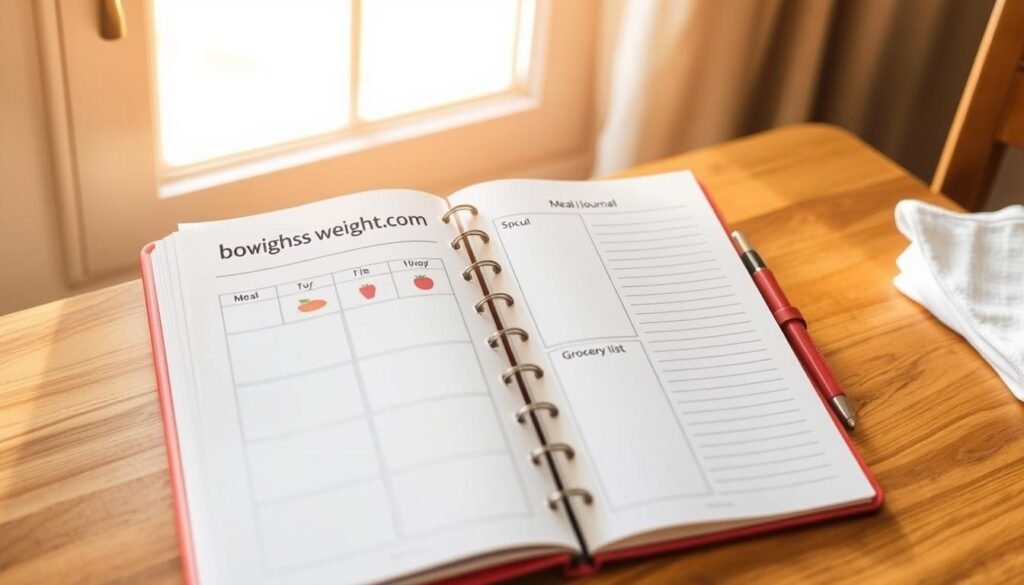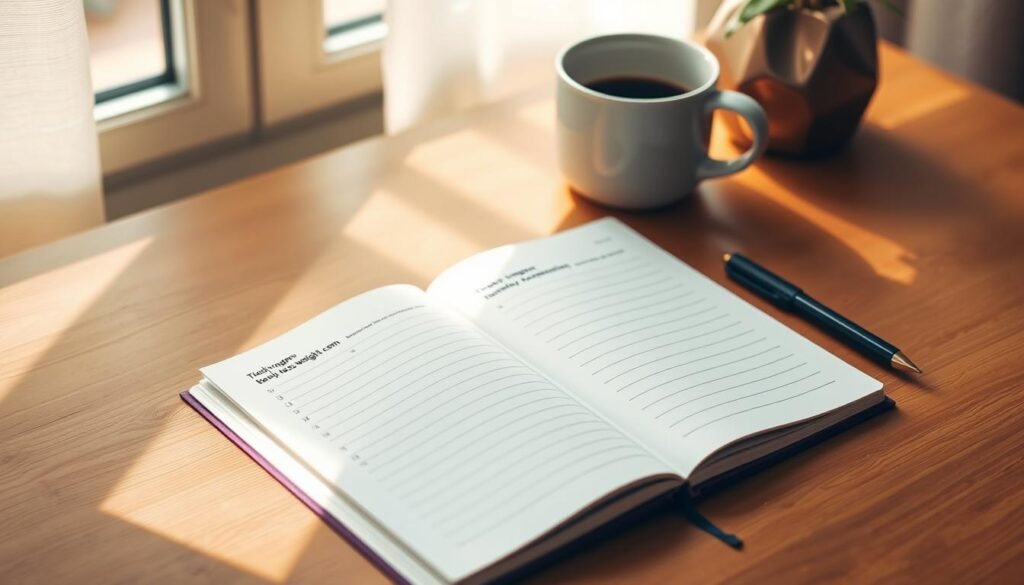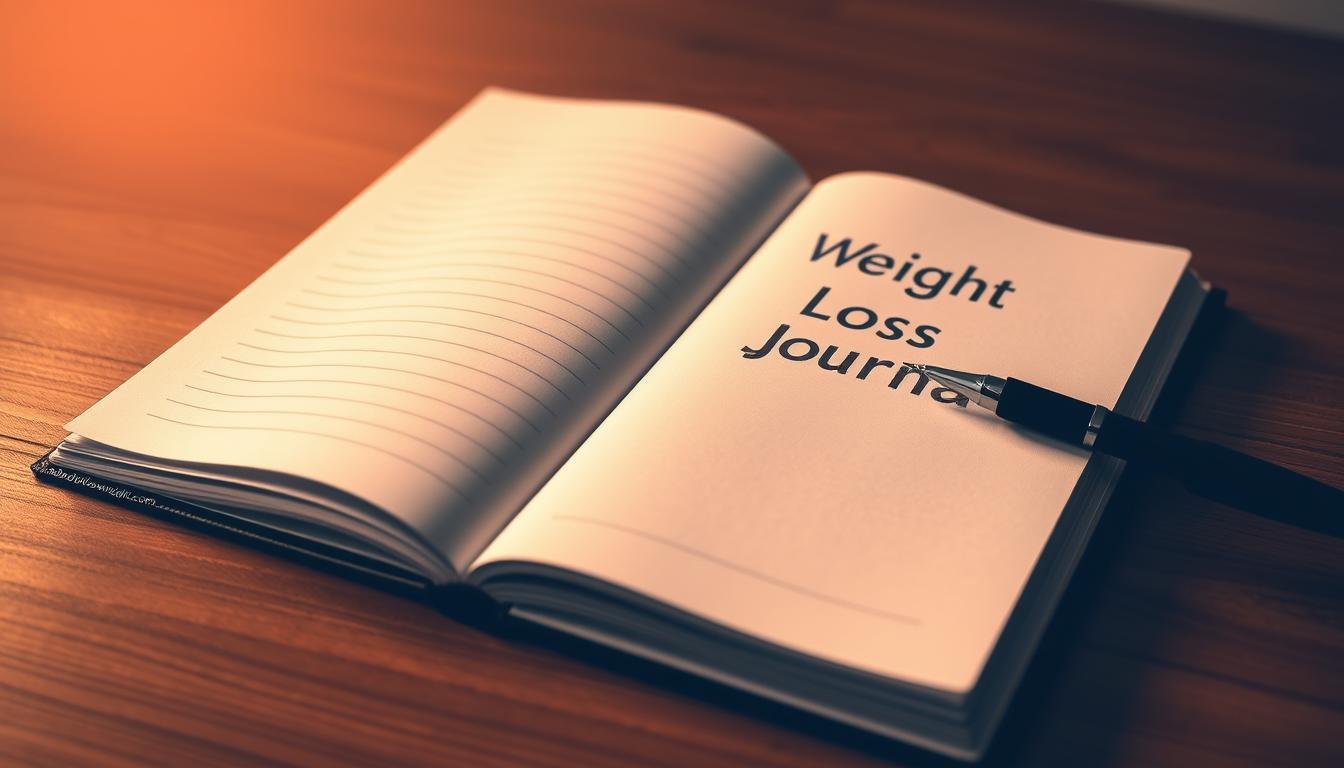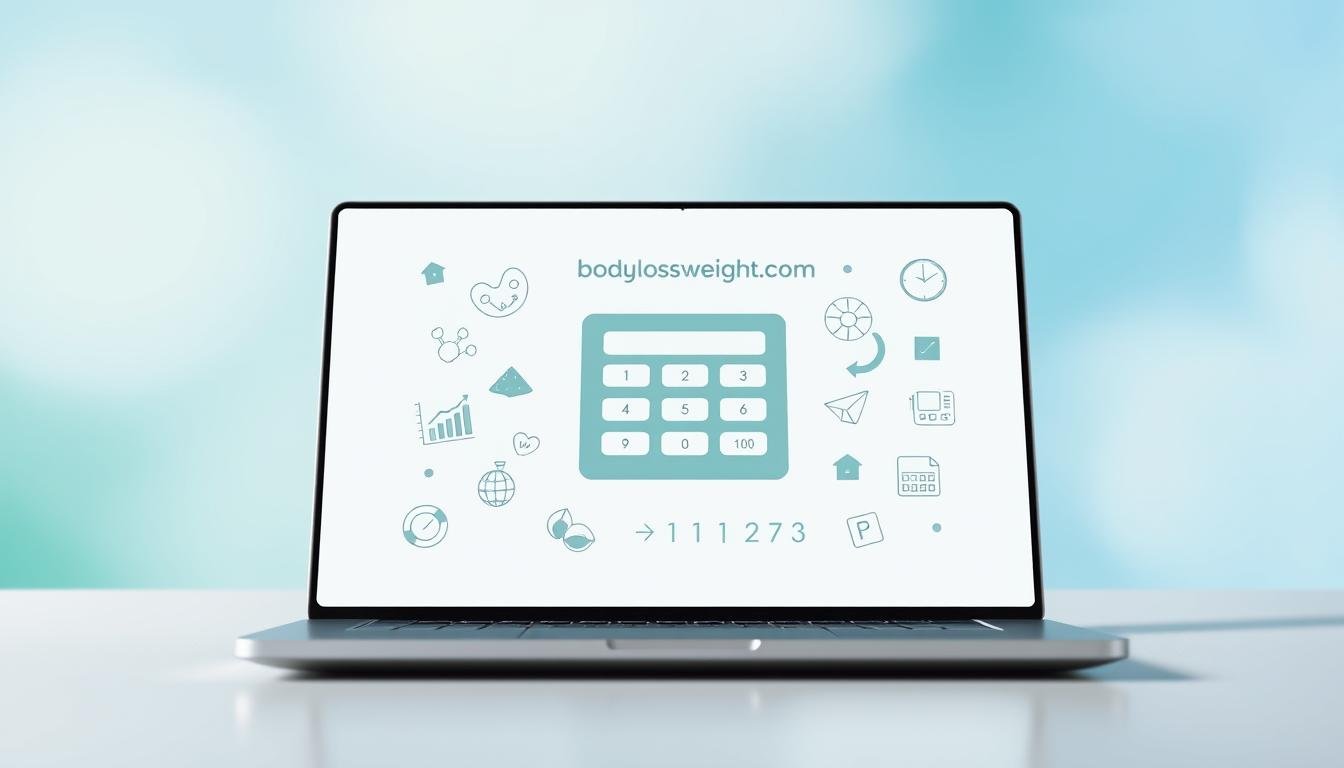Imagine stepping on the scale after weeks of hard work. You find you’ve hit a plateau. You start to feel frustrated and lose motivation.
Now, imagine having a weight loss journal. You track your meals, workouts, and feelings. In the journal, you find patterns. You see you always eat more on weekends or skip workouts when stressed.
With this info, you can change your plan. You can get your motivation back and move past the plateau. A fitness journal is more than a record. It’s a tool to help you reach your health goals.
Studies show people who use a calorie counting planner lose more weight. This simple tool makes your journey more meaningful and rewarding.
Key Takeaways
- A weight loss journal provides accountability and helps you stay committed.
- Identifying eating and exercise patterns can lead to better choices.
- Tracking your journey can help you overcome plateaus.
- Regular reflections can boost motivation and morale.
- A calorie counting planner enhances your awareness of food intake.
Understanding the Importance of Tracking Your Weight Loss Journey
Tracking your weight loss journey has big benefits. It helps you succeed more. A weight loss journal is a great tool. It lets you write down your diet, habits, and feelings about food and exercise.
Keeping a diet diary is key. It helps you see patterns in your eating and exercise. This makes it easier to make better choices.
A fitness tracker gives you insights into your activity. It keeps you on track and motivated. Studies show tracking your diet leads to more weight loss.
Tracking helps you understand what works for you. It guides you to make healthier choices. This way, you can reach your weight loss goals.
Benefits of Using a Weight Loss Journal
Using a weight loss journal can really help you live healthier. It tracks your progress and adds accountability to your day. It lets you write down what you eat and how much you move, helping you see your choices better.
Enhanced Accountability
A good weight loss journal makes you more accountable. By writing down your meals and workouts, you stay focused on your goals. Seeing your daily habits in a calorie counting planner helps you stick to your plan.
Identifying Patterns in Eating and Exercise
Tracking your habits in a journal shows you important things. You might see patterns in your eating and moving. This helps you make better choices and reach your goals.
Getting Started with Your Weight Loss Journal
Starting a weight loss journal is a big step. Pick a journal that fits your life and likes. You can use a paper journal, a digital app, or a fitness planner. Choose one that’s easy to use and looks good.
Choosing the Right Journal Format
Think about what fits your daily life. Here are some choices:
- Spiral Notebook: Perfect for those who like writing by hand.
- Binder with Sections: Great for organizing your weight loss journey.
- Mobile Apps: Best for those who like digital tracking.
Choose a journal that lets you easily log your activities, meals, and workouts. Keeping a consistent log will keep you motivated. A good journal makes losing weight easier. Pick one that you’ll enjoy using every day.
| Journal Format | Benefits |
|---|---|
| Spiral Notebook | Flexible and allows for personal customization. |
| Binder with Sections | Organized layout for different aspects of your fitness journey. |
| Mobile App | Convenient for tracking on the go with added features like reminders. |
How to Effectively Track Progress in Your Weight Loss Journal
Your weight loss journal is a key tool for reaching your goals. By tracking your activities and progress, you stay motivated. It also shows you what works best for your body.
A good diet progress diary helps you make better choices. This includes what to eat and how to exercise.
Daily Logs for Meals and Exercise
Daily logs are the heart of your weight loss journal. They help you see what helps or hinders your progress. This way, you can understand your habits better.
Use your fitness tracker to log your workouts. This helps you see what works best for you. You can find patterns that help you move forward.
Weekly Reviews to Reflect on Achievements
Weekly reviews make your diet progress diary even more valuable. They let you see what you’ve done well and what you can improve. Take time each week to look over your logs.
Notice any changes in weight, energy, or mood. This helps you connect with your journey. It also keeps you committed to healthy habits.
Celebrate your wins, no matter how small. This keeps you motivated and focused on your goals.
Creative Ideas for Your Weight Loss Journal Layout
Making your weight loss journal fun can really help. Adding cool stuff makes it more enjoyable. It also keeps you focused on your fitness goals.
Using charts and graphs is a great idea. They show your progress clearly. This makes your journey feel real.
Incorporating Visuals: Charts and Graphs
Adding body measurements, progress photos, and calorie graphs is smart. They remind you of how far you’ve come. It’s also good to use a meal planner to track your food and workouts.
This helps you stay on track with your diet. It’s all about keeping your fitness journal up to date.
Here’s a table with some ideas for your journal:
| Visual Element | Purpose | Benefits |
|---|---|---|
| Charts | Track weight loss over time | Provides visual motivation and accountability |
| Progress Photos | Document physical changes | Visual evidence of transformation |
| Caloric Intake Graphs | Monitor dietary intake | Helps in adjusting meal plans |
| Habit Trackers | Record daily routines | Encourages consistency in healthy habits |
Using pictures and colors in your journal boosts your motivation. It makes every step of your journey special.
Meal Planning and Grocery List in Your Journal
A good weight loss journal helps a lot. It makes meal planning and a grocery list easy. This helps you eat well and track your progress.
Start by planning your meals for the week. This way, you know what you’ll eat. Pick recipes that you like and that are healthy. Then, make a grocery list to buy what you need. This makes shopping easier and keeps you focused on good food.
Here’s a simple table to help organize your weekly meal prep, including days, meals, and grocery items:
| Day | Meal | Grocery Items |
|---|---|---|
| Monday | Grilled Chicken Salad | Chicken breast, lettuce, cherry tomatoes, olive oil |
| Tuesday | Vegetable Stir Fry | Broccoli, bell peppers, soy sauce, garlic |
| Wednesday | Quinoa Bowl | Quinoa, black beans, corn, avocado |
| Thursday | Oven-Baked Salmon | Salmon fillet, asparagus, lemon, herbs |
| Friday | Homemade Tacos | Taco shells, ground turkey, lettuce, cheese |
| Saturday | Smoothie Bowl | Banana, spinach, yogurt, granola |
| Sunday | Vegetable Soup | Carrots, potatoes, vegetable broth, spices |
Using these tips in your weight loss journal keeps you on track. You’ll see how they help you succeed.

Importance of Logging Moods and Emotions
Keeping a weight loss journal is great for logging your moods and emotions. It helps you understand why you eat certain foods. Many people eat because of how they feel, leading to unhealthy eating patterns.
Writing down your feelings about food helps you see patterns. A healthy habit log is very helpful for this. It lets you track how your emotions affect your diet. This way, you can improve your health and feel better emotionally.
Utilizing Habit Trackers for Daily Accountability
Adding a habit tracker to your weight loss journal helps a lot. It lets you keep track of important things like drinking water, working out, and cooking meals. This way, you can see how you’re doing and stay on track with your goals.
Color-Coding Your Habits
Color-coding your habits makes your journal look nice. You can use different colors for different things, like blue for water, green for healthy food, and red for exercise. It makes it easy to see what you’re doing well and what you need to work on.
Using a habit tracker helps you stay consistent. It shows you how your actions add up. Seeing your progress can motivate you and help you stay focused on your goals.
Strategies for Staying Motivated with Your Journal
Keeping motivated is key to losing weight. Your journal is a big help. Set small goals to feel good often. Celebrating these wins boosts your drive.
Keeping a healthy habit log in your journal is smart. It helps you see patterns and celebrate small wins. Just tracking your diet or exercise helps you stay on track. Writing positive thoughts every day keeps your goals in mind.
Being around supportive people helps a lot. Share your journal with friends or family for encouragement. Look for online groups to share tips and experiences. This makes your journal a team effort.

Celebrating Your Victories with Your Weight Loss Journal
It’s important to celebrate your wins on your weight loss journey. A weight loss journal helps you track your progress. It shows your small victories that aren’t just about the number on the scale.
These small wins can lead to big changes in how you feel. They help you feel better overall.
Documenting Non-Scale Victories
Non-scale victories are key to feeling good about yourself. They can be things like feeling more energetic or getting compliments. Or maybe you’re sleeping better.
Writing these moments down in your journal gives you motivation. It helps you see how far you’ve come. Looking back at these victories can give you the strength to keep going.
Choosing the Right Tools for Your Weight Loss Journal
Choosing the right tools can make your weight loss journal better. Pick a good weight loss journal or wellness planner. It should have room for daily logs and thoughts.
Use quality pens and colored markers to make it fun. Writing helps you understand your choices and habits better. If you like digital, many apps and software can help you track your progress.
Many wellness brands have special planners and journals. They have layouts to help you track your progress. Using these tools helps you on your health journey.
| Tool Type | Description | Benefits |
|---|---|---|
| Weight Loss Journal | A dedicated notebook for tracking meals, exercise, and progress. | Improves accountability and reflection on your journey. |
| Wellness Planner | A planner that includes sections for goal setting and mood logging. | Encourages overall health awareness and emotional balance. |
| Fitness Tools (Apps) | Digital applications that track workouts, meals, and weight changes. | Provides accessibility and quick insights via your smartphone. |
Conclusion
A weight loss journal is a great help in your health and wellness journey. It lets you track your progress and think about your experiences. This way, you get closer to your fitness goals.
Using a holistic wellness planner can boost your motivation. It keeps you focused on your goals. You can track your successes and learn from challenges.
Your weight loss journal is a guide to a healthier future. Remember, getting help from healthcare providers or groups helps too. It makes keeping up with your goals easier.
Start your weight loss journey with an open mind. Each journal entry brings you closer to your wellness dreams. A journal is a strong tool for lasting change.
FAQ
How can a weight loss journal help me achieve my fitness goals?
A weight loss journal is a great motivator. It tracks your daily activities and keeps you on track. It also helps you see patterns in your eating and exercise.
Studies show that people who journal their food and exercise lose more weight. So, journaling is key to managing your weight.
What format should I choose for my weight loss journal?
You can use a pen-and-paper journal, a digital app, or a fitness planner. Pick what fits your life best. Whether it’s a notebook, binder, or app, make sure it’s easy to use every day.
What should I include in my daily logs?
Write down your meals, how much you eat, and your workouts. Note how long and hard you work out. This helps you see what works for you.
How can I make my weight loss journal more engaging?
Add charts, graphs, and habit trackers to make it fun. Include body measurements, progress photos, and ways to visualize your goals. This makes your journey more real and exciting.
Why is meal planning important in a weight loss journal?
Meal planning helps you organize your meals and make healthy recipes. It also helps you make grocery lists. This keeps your diet balanced and healthy.
How does logging moods and emotions benefit my weight loss journey?
Logging your moods and emotions helps you understand why you eat certain foods. It helps you find better ways to deal with emotions. This improves your mental and physical health.
What are habit trackers, and how can they help me?
Habit trackers help you stay on track with lifestyle changes. They let you see your progress in a fun way. This boosts your motivation and helps you stay positive.
How can I stay motivated during my weight loss journey?
Set small, achievable goals and reward yourself when you reach them. Write positive affirmations to keep yourself motivated. Sharing your journey with friends or a community can also help.
Why is it important to celebrate non-scale victories?
Celebrating small wins, like more energy or a better mood, shows you’re making progress. Writing these down in your journal helps you stay positive and motivated.
What tools can enhance my weight loss journaling experience?
Invest in a good notebook, planners, or digital tools. Use quality pens and colored markers to make it more fun. This makes journaling a more enjoyable part of your day.


